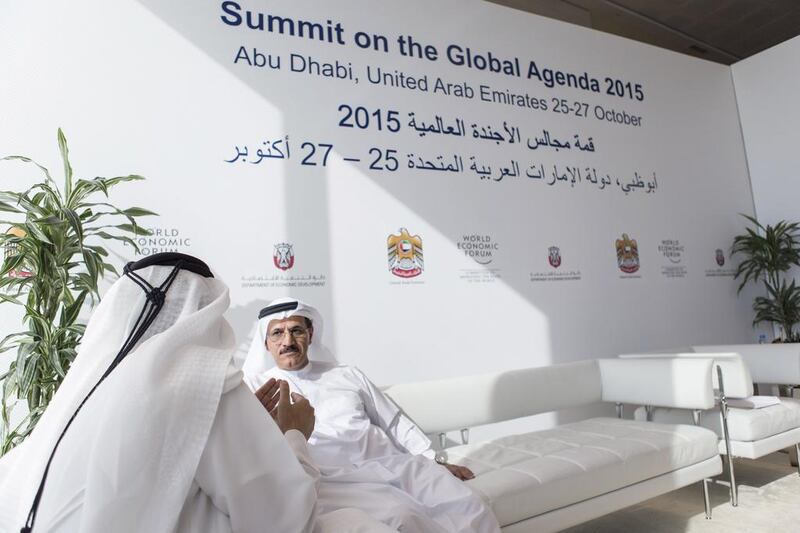Sultan Al Mansouri, the Minister of Economy, on Sunday spelt out the strategy for reducing the country’s dependence on oil revenues over the next decade.
Speaking on the sidelines of the World Economic Forum (WEF) Global Agenda Council summit in Abu Dhabi, the minister said that innovation, manufacturing, tourism and financial services would be the focus of the next phase of economic diversification.
The aim is to reduce the proportion of GDP derived from energy revenue from about 30 per cent to 20 per cent in the next 10 to 15 years.
“The country has successfully diversified throughout its history. When it was founded, oil revenue accounted for more than 90 per cent. This is all part of the diversification process,” he said.
Mr Al Mansouri said that the country could increase non-oil revenue from innovation and efficiencies in industrial processes, a focus on new manufacturing industries such as chemicals and polymers, and an expansion of tourism in the UAE.
He also identified increased revenue from financial services through the new Abu Dhabi Global Market as a big element in the intensified diversification strategy. “The UAE has the potential to reduce dependence further. Attracting the right industries is key, and if we do that, manufacturing can act as a catalyst for diversification,” he said.
He insisted that the UAE economy was well placed to weather the turbulence caused by a period of low oil prices, but added that the rest of the world needed energy prices to rise from their current levels.
“The world cannot afford for oil to stay at these levels. It means that levels of economic activity are suffering. But I think we will see a pickup in economic growth in the second half for next year in China and the rest of the world. Europe is recovering too.
“I am quite positive on the economic prospects, and on the oil price too. So where will the oil price go? I think, and a lot of experts agree with this, that about US$80 a barrel is the ideal level for all of us.”
The minister said the UAE could get through the current phase of low oil prices without big cuts in government and public-sector budgets. “The country has deep funds and is well governed. The federal budget was only trimmed a very small amount, which shows we can get through without too much trouble,” he said.
On the possible introduction of tax in the UAE, Mr Al Mansouri said: “It would have to take into account GCC policy, but if it is something that would serve the interest of the government and the people then it [tax] is something we would do, just like many other countries in the world.”
World economic growth, energy policy and infrastructure investment are included in the challenges the WEF summit is considering as it prepares to draw up the agenda for the annual meeting in Davos next January.
About 900 global thinkers, policymakers and business people will meet on Monday t the summit on Yas Island, Abu Dhabi, in what the WEF calls “the world’s biggest brainstorm”. It is the eighth time the annual pre-Davos meeting has been held in the UAE.
“Very few international forums have such a broad and flexible mandate as the WEF, and this creates opportunities for genuine innovation,” said Ali Majed Al Mansoori, the chairman of the Abu Dhabi Department of Economic Development.
“This gathering applies an interdisciplinary approach to developing long term, sustainable solutions to complex global challenges, and it is this dynamism and energy that makes our long-standing partnership with the summit such a natural fit for the UAE.”
Lee Howell, a member of the WEF managing board, said that the summit was essential to the process of getting Davos “to listen” to the issues raised by the WEF’s network of global thinkers. “To get them to listen we must make the message informal, make it inclusive of all stakeholders and make sure that we present options. There is no single solution to the challenges we face.”
Underlining the strong collaborative spirit that has been built between the WEF and the UAE since the first summit in 2008 are two projects that will have significant local impact. The first is a process to adopt Global Area Council innovations as exhibits in Dubai’s Museum of the Future, which is due to open in 2017.
The second is a high-level workshop, to be held during the summit, between UAE public officials and members of the council on the future of manufacturing to prepare the groundwork for a major international meeting in 2016 by the United Nations Industrial Development Organization (Unido) and the UAE Ministry Of Economy.
fkane@thenational.ae





